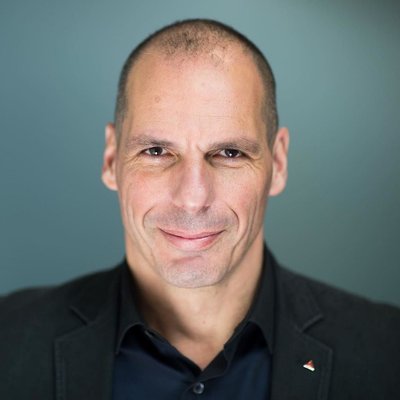
Yanis Varoufakis
Yanis Varoufakis was admirable when he tried to get a proper deal for Greece from the EU back in 2015. When this unsurprisingly failed he had to resign as minister. That same year he grounded DiEM25 “a pan-European, progressive movement that aims to democratize the EU before it disintegrates“. Their newest strategy since April 2019 is stated in The Green New Deal for Europe. It is not clear what triggered the wish to jump on the climate-bandwagon. But it is surprising that “capital” is not mentioned at all in this newest policy, and also pretty much absent in other policies and writings. However, if anyone has really felt the power of capital it must be Yanis. On top of that he did call himself an “erratic Marxist“. I take it that Diem25 wants a real democratic European Federation, not merely to “democratize the EU”.
Since at least 2009, I tried without success to get some support for this idea, most properly formulated in Coup Europa (2011, revised 2016, in Dutch; will translate it on request). Capital (including the financial sector) is the dominant force in the EU, greatly “influencing” the policies of the EU commissariat and assembled head of states, in this and other ways also directing the policies of the individual states. As part of the global capital, its interests do not parallel those of the citizens of the EU, they are global and universalist and most of the time in opposition to those interests. However almost everybody criticizing the EU thinks “parliamentary”: the institutions of the nation states are thought to work properly and only the EU has to change its ways or will have to come to an end. This is a total miscalculation. Most, if not all institutions will have to change on the national level too in major ways.
To democratize a (new) European government and at the same time have a progressive agenda is even more problematic when “progressive” is meant to be the present day program of what is called and calls itself the left. This agenda turns out to be postmodern universalist, servicing identity-politics, large-scale “migration” and climate-hysteria, sharply contrasting with what once was really progressive, left and progressive: defending and advancing the interests of the working class and their allies.
In other words it probably will turn out that a truly democratic Europe will not be progressive this modern way. The most successful political movements against the EU are the “populist movements”, generally seen as ultra-right or worse by the modern-left, which in turn makes them call them “cultural Marxists”. These movements take the interest of the “normal citizen” — consisting for a large part of the present-day lower middle class which replaced the proletariat — at heart. Unfortunately these movements are nationalist, want to end the EU not by replacing it with a federation but to break it up in nation-states. As well as the modern-left they have no analyses of the global powers that be and no ideas how to confront them. Their national states will be a plaything for capital worse than the EU is now. Apart from the question if a federal Europe can exist as a democratized EU (no chance), it’s hard to believe it can come into existence by democratic means. But it is even harder to believe it could be wrought with “grassroots movements”. If there is any chance on the first, the only way is in close cooperation with mass-movements. Not from a grassroot kind but led by a proper political leadership. Extinction Rebellion is not a massmovement (it looks like DeIM25 wants to connect with them) and neither is BLM. Both are led, but certainly not in a proper way.
A truly European movement is a good idea and absolutely necessary. A movement that doesn’t take the interests of the working classes at heart is bound to fail. It’s support and leadership should be more or less in accord with the strength of the nations. Certainly the leadership of DiEM25 is too peripheral oriented at this moment. Maybe one should study Lenin.